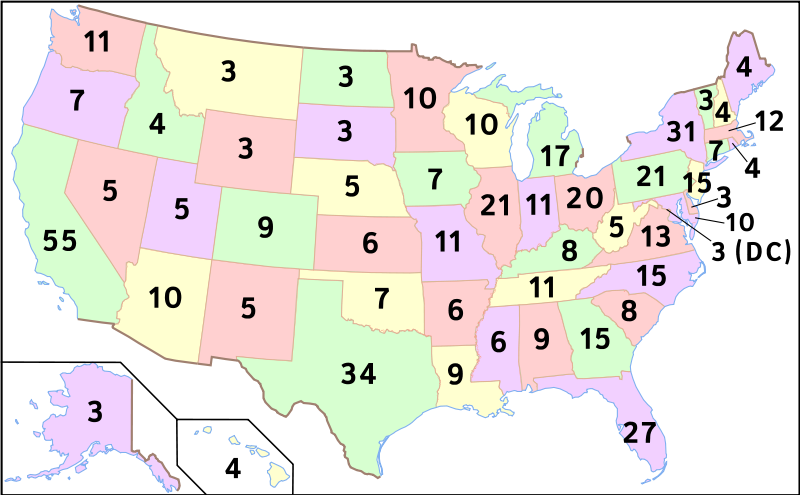1996 Presidential Election
From President
| 1996 Presidential Election | |

| |
| Elected | Michael Calvert |
| Republican | Michael Calvert |
| Democrat | Albert Hayes |
| Civic Union | None |
| Other Candidates | H. Ross Perot (Ref) |
| Electoral College | |
| Michael Calvert | 379 |
| Albert Hayes | 159 |
| None | 0 |
| H. Ross Perot (Ref) | 0 |
| Popular Vote | |
| Michael Calvert | 47,400,125 (49.2%%) |
| Albert Hayes | 39,198,755 (40.7%%) |
| None | 0 |
| H. Ross Perot (Ref) | 8,085,402 (8.4%%) |
The United States presidential election of 1996 was a contest between the Democratic national ticket of Governor Albert Hayes of Connecticut and Senator Jeremy Craig of Kansas versus the Republican national ticket of Governor Michael Calvert of Michigan for President and Senator Adam Bartlett of Pennsylvania for Vice President.
After 16 years of republican control of the White House, most political pundits believed the country suffered from fatigue from republican rule and would reject the prospect of 4-8 more years. They were proven wrong, however due to the resurgent economy of the early 1990s, and the relative peace and prosperity of the world under George Bush. Additionally, Hayes ran a rather weak campaign, not being able to convince the country of his value.
Contents |
[edit] Background
[edit] Republican Presidential Nomination
Following the successive two-term republican presidencies, many pundits believed the country had tired of the policies and personalities of Reagan/Bush. The catchphrase of the time was "Bush fatigue" given his own presence in public leadership for so long.
Bush's Vice-President, Dan Quayle was the unfortunate victim of this perception. He was the first republican to declare for the election, but never achieved the kind of support required to quell opposition from other opponents. Major candidates from all over the country entered the race, including Senators Bob Dole and Dick Lugar as well as Governors Lamar Alexander and Michael Calvert.
Former U.S. Army General Colin L. Powell was widely courted as a potential Republican nominee. However, on November 8, 1995, Powell announced that he would not seek the nomination. Former Secretary of Defense and future Vice President of the United States Dick Cheney was touted by many as a possible candidate for the presidency, but he declared his intentions not to run in early 1995. Former Defense Secretary Donald Rumsfeld formed a presidential campaign exploratory committee, but declined to formally enter the race.
Going into the 1996 primary contest, Senator Bob Dole was seen as the most likely winner. However, in the primaries and caucuses, Vice President Dan Quayle received early victories in Iowa and Delaware, while rival Michael Calvert received surprising victories in New Hampshire and Arizona. Losing the first four contests put Dole's front-runner status in doubt, and he would not recover. Dole picked up wins in North Dakota, South Dakota and South Carolina, but on March 5, Calvert won Connecticut, Massachusetts, Rhode Island and Vermont, while Quayle won Colorado Georgia, and Maryland - leaving Dole out of the loop. From that time on, Calvert benefited from Quayle and Dole fracturing each other's support, allowing him to rally the conservative base and slowly build a coalition that would hand him the nomination.
[edit] Candidates
- Governor Michael Calvert - Michigan
- Vice President Dan Quayle - Indiana
- Senator Dick Lugar of Indiana
- Governor and Secretary of Education Lamar Alexander of Tennessee
- Senate Minority Leader Bob Dole of Kansas
[edit] Debates
A series of three major debates were held for the republican field
[edit] Iowa
Dan Quayle
[edit] New Hampshire
Michael Calvert
[edit] South Carolina
Bob Dole
[edit] Republican National Convention
[edit] Democratic Presidential Nomination
[edit] Candidates
[edit] Debates
[edit] Iowa
[edit] New Hampshire
[edit] South Carolina
[edit] Super Tuesday
[edit] Republican National Convention
[edit] The General Election Campaign
[edit] Issues
[edit] Debates
[edit] The Campaign
[edit] Battleground States
[edit] Election Results
[edit] Popular Vote
[edit] Electoral College
==Analysis==
